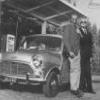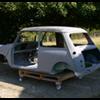In general, I've found and noticed that cheap parts are usually - but not always - the dearest parts - in the end!
Unfortunately that buy cheap buy twice theory doesnt always ring true. I have bought a lot of the top end items from the usual suspects, and have had a lot of problems. Maybe i am unlucky, but i feel the problem lies with suppliers not sampling their stock or even checking it before putting it on the shelves or sending out to customers. It appears they would prefer their customers to use their time to problem solve for them! Like i said it may just be me being unlucky, but these types of topics seem to pop up quite often.
Andy
A while back I had a long chat with Keith who owns Mini Spares. They place orders with companies for parts and issue detailed specifications in line with the original BMC specs. However, the problem comes with how to inspect the individual components in these batches. For example, a hardness specification is difficult to test and the end supplier does not have a test house of his own, so must trust the manufacturer. How can the case hardening of, for example, every front hub swivel pin be carried out?
Classic cars are all old, out-of-production vehicles and we must just feel fortunate that parts, of whatever quality, are readily available for the classic Mini. If you had, say, a Sunbeam Rapier, a Ford Zodiac or some other early 1960's car you would envy we classic Mini owners for the availability and low cost of our 1960's-era spares.
I wouldn't expect the likes of Mini Spares and other companies who have parts manufactured to have their own in house test facilities, however there are many independent test houses, with traceable certification around and their costs while variable are not at all 'out of the question' to use on samples from each manufactured batch.
From a commercial point of view, it would not make sense for the supplier to set themselves up in such a way, however having such tests carried out could not only improve the quality of what we buy, but also save their bacon when, for example, a busted ball joint puts one of us under a truck and the Coroner wants to start pointing bones. In manufactured batch quantities, such testing would add no more than 2 - 3 % to the cost at the very outside. The suppliers could also find themselves uninsured under these circumstances if they are without traceable documentation (including test data).
I regularly have harness testing carried out on gears and shafts and occasionally material composition tests also done and these are for one offs or small batches of 10 at the most, but most of the test houses can carry out all range of tests, including for example rubber analysis and it can readily be established what's in that material and if it's fit for purpose (and longevity) at that very early point.
<Edit: Only two weeks ago I binned 8 sets of New Ball Joints, straight out of the packaging, they didn't pass the simple 'file test'. >
Edited by Moke Spider, 24 November 2015 - 08:35 PM.























